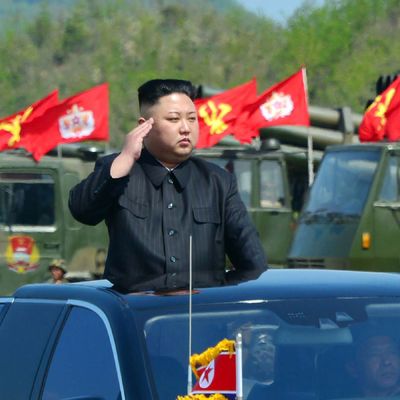
Kim Jong-un does not want you to forget that he has nuclear weapons and missiles that can threaten U.S. troops and territories. Kim Jong-un does not want Washington to think that it can quietly go back to business as usual in East Asia. And just because the Trump administration finally managed to ratchet down its rhetoric, and credit the North for the same, doesn’t mean Kim is going to make it easy on them.
Last night’s missile flight over Japan, as best we know now, broke no new technical ground. It changes nothing about the basic calculus we face: The North has a number of nuclear warheads and missile technology which can hit our troops and our allies right now. If they cannot reliably deliver a nuclear warhead to the continental U.S. currently, they will be able to soon.
The message the North seems to have sought to deliver? North Korea intends to be an aggressive nuclear actor in Northeast Asia. The message we should take? Actions like this make the risk of misperception and escalation huge.
Several aspects of this launch were intended to send a message to the U.S. and our allies.
First, the timing. Washington and Tokyo were just wrapping up a military exercise in which thousands of their forces simulated both humanitarian and offensive operations; at the same time the U.S. and South Korea were conducting a joint cyberexercise. The North finds the U.S. exercises in its neighborhood particularly galling, perceiving them as preparations for an invasion, and has long chafed against them and timed its tests and other military moves to pointedly express that displeasure. And in case that wasn’t enough, just last Friday the Pentagon announced that Patriot anti-missile batteries would be brought to several new locations across Japan. Pyongyang certainly saw that as a double threat — we ignore their concerns and we make it harder for nuclear deterrence to work on Japan. This missile launch is how North Korea tends to respond to a situation like that.
Which brings us to message number two — the location. Sending a missile over highly populated Japan is provocative all by itself — a reminder that Pyongyang can target the country — and it is also risky. Missiles sometimes break up in flight — especially new and not well-tested ones. If a breakaway piece were to tumble to Earth, it would be very difficult to know in that moment that a U.S. ally was not under direct and intentional attack. North Korean missiles have overflown Japan before, but usually with more warning. The message to Tokyo: Don’t imagine that we will content ourselves with a war of press releases with Donald Trump and leave you out of it. You are Trump’s ally — are you certain he’ll protect you?
One worrying possibility is that President Trump, who just last week at a rally in Phoenix said that he thought Kim had come to “respect” him, will take this personally — or that he will take it out on those of his team who have been urging an approach that moves away from threats and military confrontation and toward a combination of economic pressure and diplomatic openings. Actually, let’s call that a probability.
And indeed, Trump won’t be alone. Within hours of the test, South Korea was intimating that it would encourage the U.S. to station nuclear weapons in the country — something that Seoul firmly rejected in calmer times. And the government’s threat of “overwhelming force” in response included jets dropping bombs at a practice range in what was explicitly billed as a practice attack on the North’s leadership. Neither step will lower tensions.
In other words, even if the United States’ leadership were less erratic, this launch would highlight how vulnerable we are to misperceptions and accidental escalation. It ought to remind all sides how much is at risk, and how short a step it could be from a test or exercise to a full-blown shooting war.
But the North’s choice to fire this missile, plus the three short-range missiles it launched over the weekend, should remind us of something else as well. Pyongyang really detests the frequency and intensity of military exercises the U.S. conducts in the region — and this gives Washington some leverage. Kim Jong-un’s regime has signaled through formal statements as well as informal channels that it would negotiate over its nuclear program in exchange for an end to the exercises. An array of retired diplomats, experts who talk to North Koreans, and even GOP luminaries like Henry Kissinger have urged the U.S. to explore this approach. The specter of an accidental escalation after part of a missile falls on Japan should nudge Washington, at a moment where the North’s recklessness give it the high ground, to feel confident that it could negotiate from strength.





























